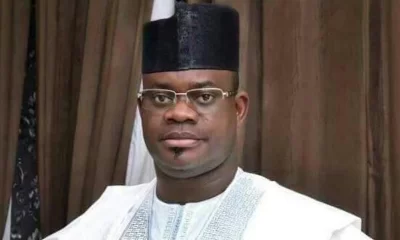Comments and Issues
International law, secession and self-determination
Published
5 years agoon
By
Editor
By Olawale Lawal
This article becomes necessary now for two reasons, namely, the steep cliff on which the nation now hangs and, second, the constant reference, by the actors, to international law and the hope that it will one day arbitrate on the issue of secession and self-determination of festering ethnic nationalities in Nigeria.
Although, Nigeria experienced bitter civil war between 1967-1970, when the Biafrans attempted an external remedial secession, efforts were made to assuage frayed nerves as the aspiration for nationhood began in earnest. Almost since 2015, the clamour for fragmentation of Nigeria resurges and reaching a crescendo in the last six months or so. The Biafran separatist idea is reborn and the Yoruba is calling for Yoruba/Oduduwa nation, but only the north seem to have played down secessionist attempt even though she suffered under economic deprivation, banditry, kidnapping and other ructions. Although, suffering under the same failing system, the north is not likely to call for separation from Nigeria now, but would readily have done that were the presidency from other regions of the country- every region sees the imperfection of the Nigerian state only when they are not in power. This is one of the key principles driving secessionist agitations in other regions of Nigeria, any other views notwithstanding.
Now to the issue. Many of those who agitate for secession or self-determination have variously opined that such endeavour is not necessarily a call for war, and have appealed to international law and its organs like the United Nations through the International Court of Justice, and even diplomatic missions and foreign affairs secretaries, to adjudicate on the issue.
So, what is the position of International law on secession and self-determination?
Self-determination is a pre-state term which is used when nationalities are under a foreign authority (like colonialism) and they are seeking self-government or determination. It is a terminology widely used during decolonization period, meaning before a state is constituted, that is, before independence of a state. It is only at the level of decolonization that self-determination is a right, but under a state, it is not a right, but a principle usually invoked when there are clear proofs of undermining of others’ rights. In this sense, international law sticks with its limited applicability outside of colonial situations. This serves to protect the boundaries of emerging states from further secession.
There are obvious reasons for this limitation of self-determination as a right, as stated by the UN, ‘if every ethnic, religious or linguistic group claimed statehood, there would be no limit to fragmentation, and peace, security and well-being for all would become even more difficult to achieve’.
The case of Eritrea is instructive here. Eritrea was not originally part of Ethiopia, but the latter annexed it in 1962 after annulling the Eritrean parliament. International law views the self-determination of Eritrea from the context of decolonization and it was supported in 1993.
The issue of secession is even more complicated basically because it is a discourse that comes up only when a state is already constituted as a sovereign authority. International law does not have any apparatus or tool with which to sit over the liquidation of an independent state. It does not recognize the right of national groups, as such, to separate themselves from the state of which they form a part by the simple expression of a wish, otherwise a street would have acquired the status of a state, were grievances the only basis for separation.
Secession is not a right under international law, but it is equally not prohibited, thus, it maintains legal neutrality, making secession not so much of matter of law but fact based on the capability of its purveyors. The point of capability of its (secession) purveyors should be stressed here. In terms of adjudication, it was only in the Kosovo secession declaration of 2008 that the International Court of Justice disfavoured the territorial integrity of a parent state in support of a secessionist group. The Kosovo case even further proved that secession is more political than legal because ‘Western’ actors were heavily involved in the breakdown of Yugoslavia and ultimately sought to defend their own breach of territorial integrity which occurred with the NATO intervention in 1999. Further, the failure of secession attempt of Somaliland in 1991, Crimea in 2014 and Saharawi Peoples Republic in 1984 shows that reliance on law has infinitesimal value when it does not sit with political preference of Western nations. The fact that Kosovo provides the only case in which recognition has had a basis in the principles of remedial secession in international law is demonstrative of this.
It has also been observed that in the process of agitations for secession, some actors have gone ahead to destroy federal institutions in their domain like police stations, court premises, correctional facilities and even killings, likely, under the assumption that this ruction will one day serves as basis of rejection of the Nigerian state. The ICJ has consistently provided a solid legal position against the emergence of any state with terror background. The failure of the Kurdish referendum of 2017 provides further clarity on the position of international law and not providing effectiveness for terror organizations and group, much less, using it as a tool to establish a terror state.
One major concern for scholars of international law is that despite its legal neutrality, there should be some concern for cases of gross violations of human rights of individuals belonging to a specific group, and as an elixir, the principle of remedial secession is prescribed. But when this is established, the first level of intervention will be for the state to use its internal political machinery to address the issue and when that fails, international collaboration will have to address the violations and then finally, the application of remedial secession.
At this level, the real international politicization of statehood begins as the emerging state seeks recognition. If there is any doubt about the limited role of international law or its neutrality in issues of self-determination or secession, the case of the Palestine, is a resourceful lesson. Although it is a de facto state, given its presence in international affairs and the fact that about 137 states recognize it, and despite human rights abuses spanning over half-a-decade, no right to remedial secession has been extended to Palestine and its legal status remains entirely unclear.
The net implication of the position of international law on secession is that law really has little role to play in the agitations. Secession therefore is usually a call for test of might. If secessionists prevail, it simply means that they are able to, and often this is both a function of capability and fact. When they lack the capacity, it is a suicidal venture, but the state also needs to take caution because same international law detests violation of fundamental human rights.
It should be stated here however that umbrageous acts against the state are not principled under any human rights. When a state is already constituted, it is presumed that a government is in place and maintaining an organized opposition to its authority is an insurrection.
If all that mattered in secession is arson and killings, the Scots should have destroyed Scotland, the Québec should have set Canada ablaze, Catalonia should have grounded Barcelona etc. Granted, many things are wrong with governance and government in Nigeria and these should be reformed fundamentally.
Dr. Lawal is of the Department of History and International Studies, Lagos State University. First published in The Nation
Trending

 Latest1 week ago
Latest1 week agoLagos govt confirms no casualties at Lagos secondary school building collapse

 Football1 week ago
Football1 week agoSlot hails Salah’s return as Liverpool prepares for Burnley clash

 Business1 week ago
Business1 week agoAmazon’s Project Kuiper enters Nigeria’s internet market, rivals Elon Musk’s Starlink

 Latest1 week ago
Latest1 week agoMakoko residents decry ‘broken promises’ as demolitions extend beyond agreed safety setbacks

 Crime1 week ago
Crime1 week agoInside the courtroom: Allegations of coercion, silence, power in Emefiele’s high-stakes trial

 Business1 week ago
Business1 week agoJapan’s Mitsubishi to acquire $7.5bn U.S. natural gas assets in major overseas deal

 Entertainment1 week ago
Entertainment1 week agoAlleged leaked chats deepen paternity dispute between Davido, 12-year-old claimant

 Latest1 week ago
Latest1 week agoThe many controversies of Yahaya Bello: A deep dive into Kogi ex-governor’s tenure

